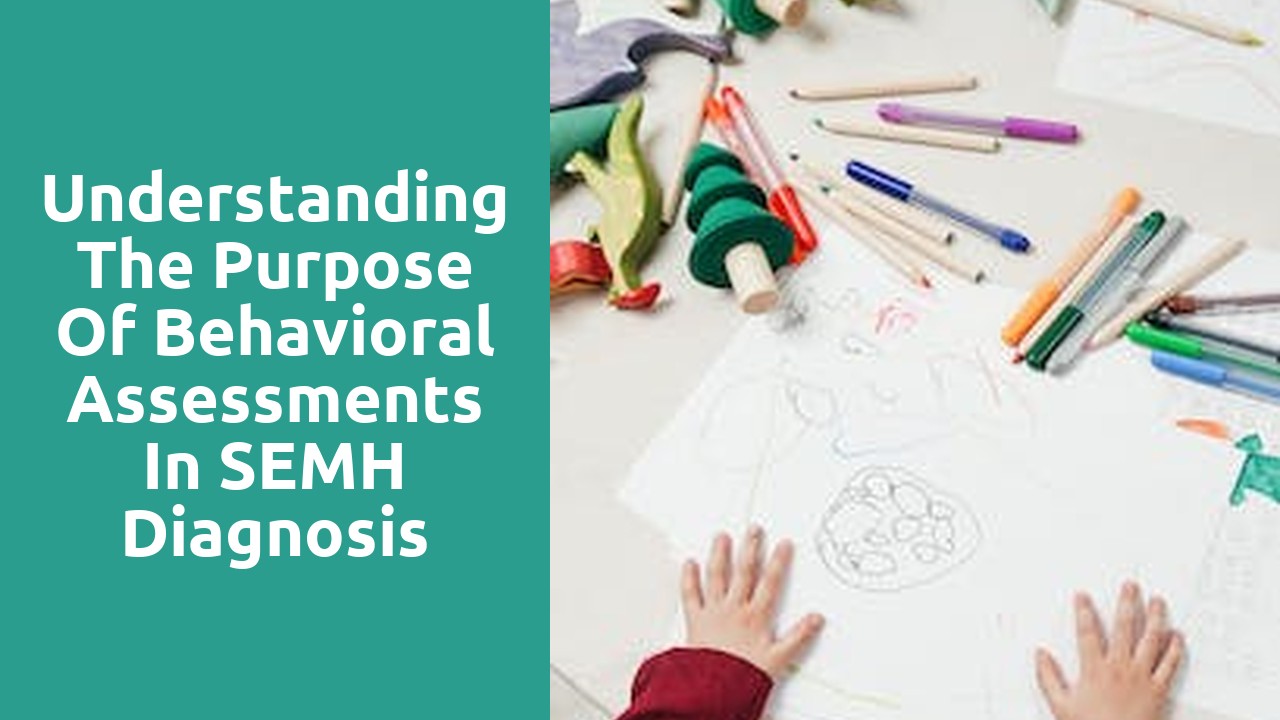

Behavioral assessments play a crucial role in diagnosing Social, Emotional, and Mental Health (SEMH) disorders. These assessments involve a systematic approach to observing and analyzing an individual's behavior, emotions, and thoughts. By examining these aspects, professionals can gain valuable insights into an individual's psychological well-being, identifying any potential SEMH disorders.
One of the primary reasons why behavioral assessments are indispensable in SEMH diagnosis is their ability to provide objective and observable data. Unlike self-reported measures, which may be influenced by social desirability or personal bias, behavioral assessments provide concrete evidence of an individual's functioning. This objective data allows practitioners to make more accurate and reliable diagnoses, guiding the development of appropriate intervention strategies. Additionally, by observing behaviors across different contexts and settings, behavioral assessments can provide a comprehensive picture of an individual's SEMH functioning, identifying patterns and triggers that may contribute to their difficulties.
Behavioral assessments play a crucial role in unraveling the significance of diagnosing social, emotional, and mental health (SEMH) disorders. These assessments provide valuable insights into an individual's behaviors, emotions, and overall functioning, helping professionals to better understand and identify potential underlying issues. By observing and analyzing an individual's behavioral patterns, clinicians and experts can gather concrete information about their mental well-being and make more accurate diagnoses.
One of the significant advantages of behavioral assessments for SEMH diagnosis is their ability to provide objective and measurable data. These assessments use specific criteria and standardized tools, making the process more reliable and less subjective. By relying on observed behaviors rather than solely on self-reported experiences or symptoms, behavioral assessments offer a more comprehensive evaluation of an individual's mental health. This helps to reduce the risk of misdiagnosis or overlooking crucial aspects of an individual's condition, leading to more effective treatment decisions and interventions.
Behavioral assessments play a crucial role in diagnosing social, emotional, and mental health (SEMH) disorders. These assessments aim to shed light on the complex and multifaceted nature of these disorders by closely examining an individual's behaviors, emotions, thought patterns, and social interactions. By analyzing these aspects, professionals can gain valuable insights into the underlying causes and manifestations of SEMH disorders.
The purpose of behavioral assessments in SEMH diagnosis goes beyond simply identifying the presence of a disorder. These assessments help professionals develop a comprehensive understanding of an individual's strengths, weaknesses, and specific needs, allowing for tailored interventions and support strategies. Moreover, behavioral assessments contribute to the early detection and timely intervention of SEMH disorders, enabling individuals to access appropriate interventions and services that can positively impact their well-being and overall functioning. In essence, behavioral assessments serve as a powerful tool in not only diagnosing SEMH disorders but also guiding effective treatment and support plans.
Behavioral assessments play a crucial role in identifying Social, Emotional, and Mental Health (SEMH) disorders. These assessments provide professionals with valuable insights into an individual's behavior, allowing them to diagnose and understand the underlying issues affecting their mental and emotional well-being. By carefully observing and evaluating an individual's behavior patterns, professionals can gather information necessary for accurately diagnosing SEMH disorders.
One of the reasons why behavioral assessments are vital in identifying SEMH disorders is that they provide objective data. Unlike self-reporting or subjective observations, behavioral assessments rely on concrete evidence that can be measured and analyzed. This allows professionals to make more informed decisions regarding diagnosis and treatment. Additionally, behavioral assessments can assess a wide range of behaviors, including social skills, emotional regulation, and cognitive functioning. By examining these various aspects of behavior, professionals can gain a comprehensive understanding of an individual's SEMH challenges, leading to more targeted interventions and support strategies.
Behavioral assessments have proven to be invaluable tools in diagnosing social, emotional, and mental health (SEMH) disorders. They provide valuable insights into an individual's behavior, emotions, and thought patterns, allowing clinicians and educators to better understand their needs and provide appropriate interventions. By observing and documenting an individual's behavior in various settings and situations, behavioral assessments can help identify patterns, triggers, and underlying issues that may contribute to SEMH disorders.
One of the key advantages of behavioral assessments is their objectivity. Unlike self-report measures, which rely on individuals' subjective perceptions and interpretations of their own behaviors, behavioral assessments provide an external perspective that is based on observed behaviors and interactions. This objectivity reduces the risk of bias and allows for more accurate and reliable diagnoses. Moreover, behavioral assessments can provide a comprehensive picture of an individual's functioning by considering multiple factors, such as their social skills, coping strategies, and adaptive behaviors. This holistic approach enables clinicians and educators to develop targeted interventions and supports that address the specific needs of individuals with SEMH disorders.
Behavioral assessments play a crucial role in diagnosing and understanding Social, Emotional, and Mental Health (SEMH) disorders. Through these assessments, professionals are able to gain valuable insights into an individual's behavior patterns, emotions, and social interactions. By examining various aspects of behavior, such as communication skills, attention span, and self-regulation, these assessments contribute to a comprehensive evaluation of SEMH disorders.
One way in which behavioral assessments contribute to the diagnosis of SEMH disorders is by providing valuable information about the individual's social and emotional functioning. For instance, an assessment may involve observing the individual's ability to form and maintain relationships, their level of empathy, and their response to various social situations. This information helps professionals understand the individual's social and emotional challenges, enabling them to make an accurate diagnosis and develop appropriate intervention strategies. Additionally, behavioral assessments can assist in identifying underlying causes of certain behaviors, allowing professionals to address the root issues and provide targeted support. Overall, the insights gained from behavioral assessments greatly contribute to the understanding and diagnosis of SEMH disorders.